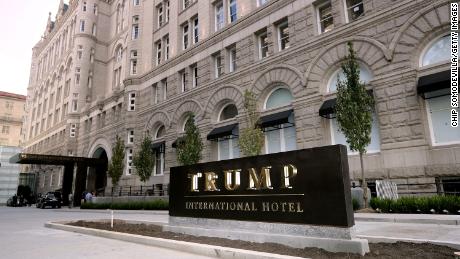Trump has asked the DC District Court to block the National Archives from giving more than 700 pages of documents to the House Select Committee investigating January 6. He’s claimed the House’s investigation is illegitimate, and that his role as a former President should give him control over reviewing and deciding upon access to the records.
The hearing may be the pivotal moment in a potentially historic legal fight about the authority of a former president, the House’s investigative power and the reach of executive privilege.
It is set to begin at 11 a.m. ET.
In the short term, the case also may have huge implications for the bipartisan House investigation, which is pushing for records and witnesses before the midterm elections take place next year. Without access to the documents, the House could be hampered significantly in its fact-finding.
In court, the House has cast its investigation as one of its most critical tasks in history. “In 2021, for the first time since the Civil War, the Nation did not experience a peaceful transfer of power,” lawyers for the House wrote over the weekend. “A peaceful transfer of power from one President to another is crucial to the continuation of our democratic government. It is difficult to imagine a more critical subject for Congressional investigation, and Mr. Trump’s arguments cannot overcome that pressing legislative need.”
Judge Tanya Chutkan could rule as soon as Thursday, even from the bench during the hearing. Any result is likely to be appealed, but the clock will be ticking for both the House and for Trump.
The National Archives, a part of the executive branch that inherited Trump’s presidential records after he left office, has already decided the House should get access to the records from Trump’s term as President. The agency is set to turn those over beginning next week, on November 12, unless Chutkan or an appeals court orders otherwise.
Trump has turned to the court system several times in recent years to slow down or block Congress from accessing records he believes should stay private. The courts are still working out many of those disputes, such as in cases related to his personal accounting firm’s work, his IRS tax returns and his company’s banking records.
While President, he was able to hold off House subpoenas of his closest advisers using broad privilege claims and the Justice Department’s backing. And even before Trump’s presidency, lawsuits over executive privilege in document collections have dragged on for years.
But the issues about executive privilege that Trump raises now put the court in a novel position weighing the needs of the House against his pleas for privacy for his now-completed time in office.
“Permitting the expansive request here would harm future presidents and their close aides by allowing invasive congressional fishing expeditions that will certainly chill candid advice and harm the institution of the presidency,” Trump’s lawyers wrote to the court this week.
The records Trump wants to keep secret at this time appear to be a treasure trove of notes from his top advisers related to his insistence the election was stolen and his reaction to his supporters attacking the US Capitol on January 6. They include parts of the files from chief of staff Mark Meadows, from whom the committee has been seeking testimony, and other key figures like press secretary Kayleigh McEnany. In recent weeks, Meadows has engaged with the House but hasn’t come forward to speak — an apparent stalemate that could shift depending on the Trump court case’s outcome.
The Archives has given a taste of what Trump is trying to protect in a list, down to the page count, of the handwritten memos, draft public statements, call logs to Trump and Vice President Mike Pence, White House visitor records and more from the files of key White House officials.
Those types of records, if obtained by the House, could answer some of the most closely guarded facts of what happened minute by minute between Trump and other high-level officials, including people around him watching the siege and those officials who were under attack.
The Biden White House has decided it wouldn’t asserted executive privilege on the records the Archives has reviewed so far, citing the extraordinary situation of the attack on Congress.
The Archives continues to work through Trump’s papers and set dates for them to be shipped to Congress.
“President Biden’s sober determination that the public interest requires disclosure is manifestly reasonable, and his to make,” lawyers for the Biden administration have written in court.





